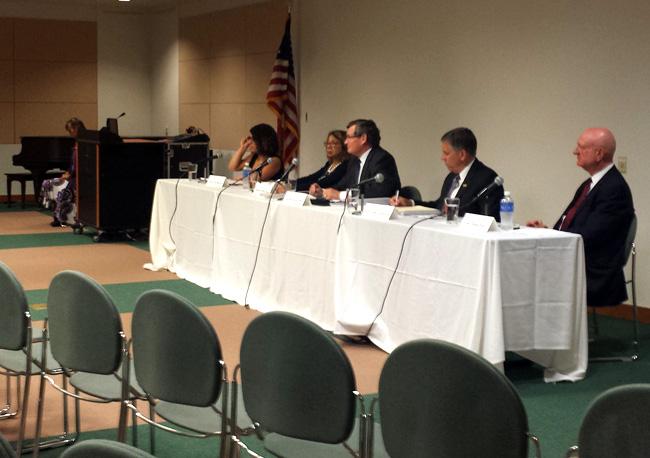
Photo Credit: Jonathan Diaz/News Editor
With reaction to student success fees mixed, a committee was formed to investigate reaction to student success fees and open forums were scheduled for three campuses. At the CSUN forum, students from CSU Fullerton and Cal Poly San Luis Obispo were also in attendance.
Their reactions to their student success fees were mostly positive. CSUN Associated Students members said the student success fee, known here as the campus quality fee, has improved the campus with longer library hours, tutoring and peer programs, computer labs and class availability. Others called for greater transparency in regards to how the funds are used.
As part of an effort to secure funding for the varying campus needs and educational costs, the CSU system developed an executive order which helps CSU campuses determine the types of fees each campus can charge students.
One of those fees is the student success fee, which has received an increasing amount of attention in the past year as the CSU board discusses whether to add or raise fees, on each individual CSU campus. These fees go toward campus improvements, improve class availability and help students graduate on time.
Before a fee is implemented or a fee is increased, the CSU campus must meet certain principles before establishing a new price. This is to ensure the fee is necessary and will benefit the students of that campus in some way.
According to Executive Order 1054, “The development of a new fee policy for student must be accompanied by clarification of the responsibility of the state.”
Fees, such as the student success fee, are put in place to essentially make up the difference between the funding we receive from the state of California and what is needed by each individual campus.
The CSU Board of Trustees said funding from the state has not been as adequate due to various California state budget crises.
“CSU enrollment levels have always been, and will continue to be, determined by the level of support provided by the state budget,” according to Executive Order 1054. “Student fee revenues, in turn, can enhance the academic programs, improve the availability of courses, and facilitate student progress, but they cannot, and never should be expected to support increased access.”
What the student success fee allows campuses to do is pay for enhancements to academic programs and student experience, which the state does not always fully cover. The student success fees fund the specific needs at each campus, which is why the fees vary across CSU campuses.
“State law (Education Code Section 89703) limits CSU … use of tuition revenues to instructional support,” according to executive order 1054. “It is important to resolve these statutory problems so that revenue generated from increased student fees could support programs of instruction. It is, therefore, very important that policy makers remove the cap on tuition and/or remove the barrier to using student fee revenues to enhance instructional programs.”
This year, at a Sept. 8 CSU Board of Trustees meeting, a budget act created a new state law, which placed a moratorium on new success fees until January 2016.
Ryan Storm, assistant vice chancellor, was tasked with reviewing the CSU fee policy as it relates to student success fees and with recommending any changes to the policy.
An online forum is open for public comment at calstate.edu/studentsuccessfeeforum.
Another meeting will take place Tuesday at CSULA.
More discussion will take place at the Nov. 18 Board of Trustees meeting in Long Beach.
Chart by Moises Ajanel. Contributing reporting by Silvia Gutierrez, Jonathan Diaz and Michael Arvizu.










